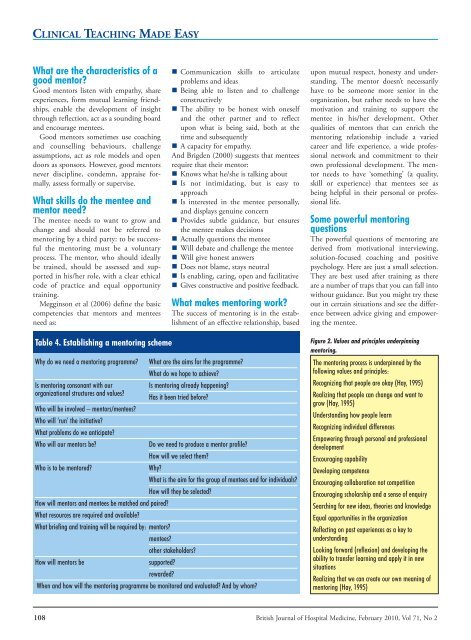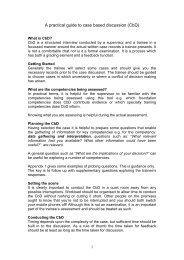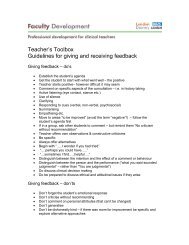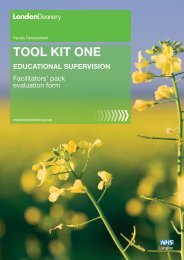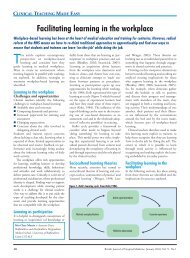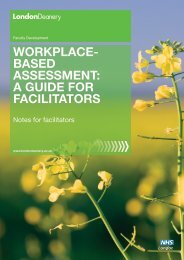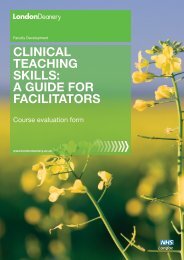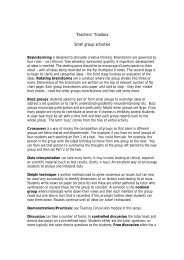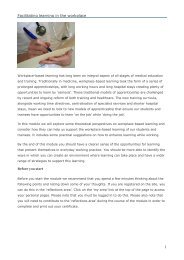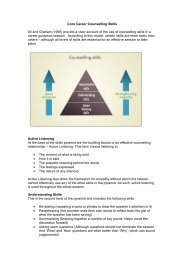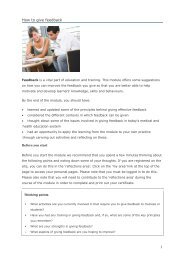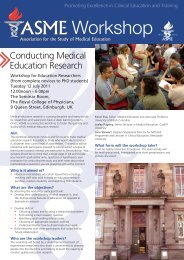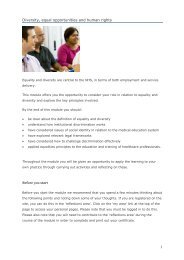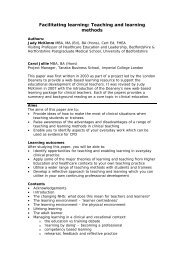Mentoring - Faculty Development - London Deanery
Mentoring - Faculty Development - London Deanery
Mentoring - Faculty Development - London Deanery
You also want an ePaper? Increase the reach of your titles
YUMPU automatically turns print PDFs into web optimized ePapers that Google loves.
Clinical Teaching Made EasyWhat are the characteristics of agood mentor?Good mentors listen with empathy, shareexperiences, form mutual learning friendships,enable the development of insightthrough reflection, act as a sounding boardand encourage mentees.Good mentors sometimes use coachingand counselling behaviours, challengeassumptions, act as role models and opendoors as sponsors. However, good mentorsnever discipline, condemn, appraise formally,assess formally or supervise.What skills do the mentee andmentor need?The mentee needs to want to grow andchange and should not be referred tomentoring by a third party: to be successfulthe mentoring must be a voluntaryprocess. The mentor, who should ideallybe trained, should be assessed and supportedin his/her role, with a clear ethicalcode of practice and equal opportunitytraining.Megginson et al (2006) define the basiccompetencies that mentors and menteesneed as:• Communication skills to articulateproblems and ideas• Being able to listen and to challengeconstructively• The ability to be honest with oneselfand the other partner and to reflectupon what is being said, both at thetime and subsequently• A capacity for empathy.And Brigden (2000) suggests that menteesrequire that their mentor:• Knows what he/she is talking about• Is not intimidating, but is easy toapproach• Is interested in the mentee personally,and displays genuine concern• Provides subtle guidance, but ensuresthe mentee makes decisions• Actually questions the mentee• Will debate and challenge the mentee• Will give honest answers• Does not blame, stays neutral• Is enabling, caring, open and facilitative• Gives constructive and positive feedback.What makes mentoring work?The success of mentoring is in the establishmentof an effective relationship, basedupon mutual respect, honesty and understanding.The mentor doesn’t necessarilyhave to be someone more senior in theorganization, but rather needs to have themotivation and training to support thementee in his/her development. Otherqualities of mentors that can enrich thementoring relationship include a variedcareer and life experience, a wide professionalnetwork and commitment to theirown professional development. The mentorneeds to have ‘something’ (a quality,skill or experience) that mentees see asbeing helpful in their personal or professionallife.Some powerful mentoringquestionsThe powerful questions of mentoring arederived from motivational interviewing,solution-focused coaching and positivepsychology. Here are just a small selection.They are best used after training as thereare a number of traps that you can fall intowithout guidance. But you might try theseout in certain situations and see the differencebetween advice giving and empoweringthe mentee.Table 4. Establishing a mentoring schemeWhy do we need a mentoring programme? What are the aims for the programme?What do we hope to achieve?Is mentoring consonant with ourIs mentoring already happening?organizational structures and values?Has it been tried before?Who will be involved – mentors/mentees?Who will ‘run’ the initiative?What problems do we anticipate?Who will our mentors be?Do we need to produce a mentor profile?How will we select them?Who is to be mentored?Why?What is the aim for the group of mentees and for individuals?How will they be selected?How will mentors and mentees be matched and paired?What resources are required and available?What briefing and training will be required by: mentors?mentees?other stakeholders?How will mentors besupported?rewarded?When and how will the mentoring programme be monitored and evaluated? And by whom?Figure 2. Values and principles underpinningmentoring.The mentoring process is underpinned by thefollowing values and principles:Recognizing that people are okay (Hay, 1995)Realizing that people can change and want togrow (Hay, 1995)Understanding how people learnRecognizing individual differencesEmpowering through personal and professionaldevelopmentEncouraging capabilityDeveloping competenceEncouraging collaboration not competitionEncouraging scholarship and a sense of enquirySearching for new ideas, theories and knowledgeEqual opportunities in the organizationReflecting on past experiences as a key tounderstandingLooking forward (reflexion) and developing theability to transfer learning and apply it in newsituationsRealizing that we can create our own meaning ofmentoring (Hay, 1995)108 British Journal of Hospital Medicine, February 2010, Vol 71, No 2BJHM_106_109_CTME_mentoring.indd108 108 2/2/10 11:17:53


